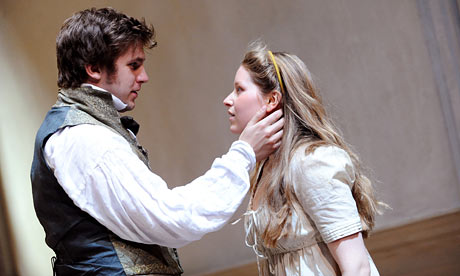 |
| That's right. Jane's taking over the world. Google agrees. |
Yesterday was a very special day in the literature world. And, sadly, many people went about their days unaware of this monumental occasion. Yesterday, December 16th was Jane Austen’s 235th Birthday! Yes, I had been looking forward to this day and made sure to celebrate by dedicating a Facebook status to her and telling absolutely everyone I knew that it was her birthday. It may sound crazy, but I wasn’t the only one celebrating. Janeites worldwide tweeted about the occasion and Google UK even dedicated its “doodle” graphic to her!
As part of the celebration, I find it necessary to reflect on all that Ms. Austen has done for the literary world. (However, I did not sing to her for two reasons:
1.) She would never want to hear me sing and
2.) If she were alive today, she’d be confused, because Happy Birthday didn’t become popular until after 1893.)
She wrote only six novels in her lifetime, but all six are still read and reprinted to this day. It has been estimated that at any one time around the world, there are more than 600 Jane Austen adaptations being produced. China has increased its Jane Austen output by 400 percent over the past seven years, and looks set to be the world leader by 2012!
Her characters are immortal, not only in their homes in her books, but also in film. Keira Knightley made Pride and Prejudice sexy with her portrayal of Elizabeth, and in turn, taught (some) boys that Jane Austen can be cool. Wait…scratch that. Is cool.
 |
| Of course she'd pose with a notebook. She's just that awesome. |
Sadly, Jane never married. However, this never stopped her from thoroughly enjoying life. Her best friend was her older sister Cassandra, with whom she regularly exchanged lengthy letters. She was also close with her nieces and nephews, allowing her an outlet for any motherly affection she might’ve felt. Based on her strong female characters, it is clear that Jane held very high “standards” when it came to the opposite sex. She had a short, love affair with Tom Lefroy when she was twenty years old. Even though she was madly in love with him, his family found the Austen family to be too poor for their distinguished son and believed he could do better. A reflection of this dilemma can be seen in Austen’s last published novel Persuasion.
Austen is often mistaken as the “mother of chick lit.” However, this title could not be further from the truth. Though often romantic, Austen’s stories are not full of mushy, gushy pet names and senseless “he-loves-me-he-loves-me-not” dilemmas. Instead, Austen advocates the female use of reason in relationships (imagine that!) Instead of relying solely on their feelings, Austen reminds women to use their heads. Through her stories, Austen also effectively proves that women are sensible creatures. It’s Austen’s subtle sarcasm, realistic characters and ironic narration that have led me to fall in love with her writings.
I often say that I would like to live in Jane Austen’s time period. A life full of reading, writing, dressing up, taking walks and going to balls sounds absolutely splendid to me. But there’s also more to an Austen novel than these everyday events. Many critics complain that “nothing happens” in her novels, which makes them incredibly boring. The point is, Austen proves that a lot can happen in every day life -- that snide comments people make and shy glances do have an impact. Through Austen, we can see that little actions can have a big effect on others. Austen showed audiences that using one’s head in decision making is not to be undervalued.
 |
| Aren't they adorable? Whoever combined Pride and Prejudice, babies and cartoon characters is a genius. |
Thanks Jane, for crafting the first real novel. For giving women everywhere the right to think for themselves in relationships and for proving that smart women are not to be taken for granted. May your legacy continue on for another 235 years and more.
Cheers!





.gif)


.jpg)